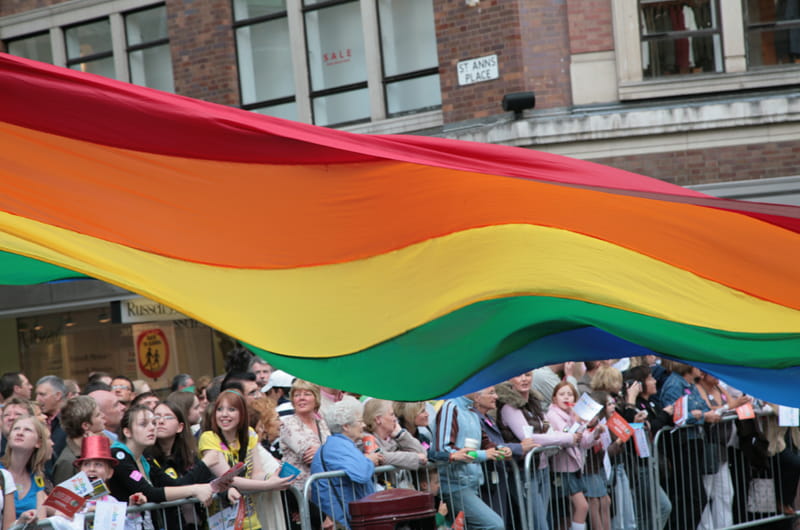The Indiana Religious Freedom Restoration Act: A Q&A With Law Professor David S. Cohen
 By Frank Otto
By Frank Otto

- Ribbon-Cutting Ceremony Marks Official Unveiling of Drexel Station at 30th Street
- Express Your Thoughts About Climate Change in the Anthems for the Anthropocene Contest
- 40 Years Ago, Drexel Made Computer — and Apple — History
- Drexel Helps Promote Philadelphia as a Premier Destination for Global Education

A new law in Indiana has dominated headlines lately as opponents have blasted it as “discriminatory” against the LGBTQA community.
The Religious Freedom Restoration Act (RFRA) makes it legal for those who believe their religious beliefs are “substantially burdened” to seek “relief” from whatever governmental mandate imposes that burden.
With the state’s legislators under fire and seeking to “clarify” the law, Kline School of Law Professor David S. Cohen discussed with DrexelNow the controversial legislation, other laws similar to it, and what it means in context of the country’s consciousness of the LGBTQA community.
- Can you give a quick explanation of the RFRA and what it allows for?
The law allows people and businesses in Indiana to assert in court that they do not have to follow a state or local law because it violates their religious beliefs. They are not guaranteed to win with this claim, as the state can rebut this claim by showing that it has a very important interest in applying the law, despite the religious belief. But, it gives those with religious beliefs a strong claim that they do not have to follow the law because of their religion. The law has garnered so much attention because claims of religious freedom have a long history of being the basis for people to assert that they do not have to follow anti-discrimination laws. Racists claimed religious freedom in the 1960s as a way around civil rights laws. Sexists have done the same as a way to avoid employing women. And now people who do not want to serve or employ gay and lesbian individuals (or couples) are making the same claims.
- Legally, do you believe it is tenable?
It depends on what you mean by “tenable.” Is it legally allowed to have a bill like this? Yes, it is. The federal government has a religious freedom bill. It was the basis of last summer’s decision by the Supreme Court that allowed Hobby Lobby to avoid having to provide contraception for its female employees. Nineteen other states have religious freedom bills as well, including Pennsylvania. So, this law is legally allowed and not uncommon. If by “tenable” you mean, “Is it politically possible to have a bill like this?” then what we’re seeing in the public reaction to Indiana is that it’s very politically controversial. Since it’s quite clear that the Indiana law was written to allow anti-gay discrimination and most people in this country do not approve of anti-gay discrimination, states that now try to have a broad religious freedom law like Indiana are going to find that they will face a huge national backlash.
- Is there other legislation similar to the RFRA in the U.S.? How would the fate of this law affect them?
Yes, the federal government and 19 states have laws similar to the Indiana law, though Indiana’s is broader in important ways. Given the backlash against the Indiana law, it would be great if there was momentum that caused the other states and the federal government to revisit their laws and carefully consider their implications for discrimination, particularly discrimination against gay and lesbian individuals.
- Do you think people fully understand the RFRA?
No, not at all. People think that anti-gay discrimination is already against the law and are now outraged because they believe this law is what allows it. Nothing could be further from the truth throughout most of the country, including most of Indiana. In most of Indiana, anti-gay discrimination is perfectly legal and was perfectly legal before this law was enacted. This is true in the majority of states and under federal law as well. Most anti-discrimination laws that exist cover race, religion and usually sex, but they do not usually cover anti-gay discrimination. Thus, even before this law, employers, businesses, schools and landlords in most of the country were able to discriminate based on sexual orientation. This needs to change, and I really hope that the attention on Indiana can morph into attention on the lack of protection that exists throughout state and federal law for gay people. And then focus on changing that!
- What do you feel the response to this law shows about our current state as a country?
The response is a clear indication of how far the country has moved on issues of sexual orientation. We, as a country, are not OK with discrimination against gay people. But, people need to realize that, even though this is clearly the majority position, it is not the position of most laws and that needs to change.
Check out Cohen's op-ed piece in USA TODAY on the RFRA and Indiana's legal climate before the law even passed.
In This Article
Drexel News is produced by
University Marketing and Communications.